|
|
|
Sort Order |
|
|
|
Items / Page
|
|
|
|
|
|
|
| Srl | Item |
| 1 |
|
| 2 |
|
| 3 |
ID:
024871
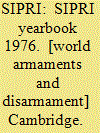

|
|
|
|
|
| Publication |
Cambridge, The MIT Press, 1976.
|
| Description |
xvii, 493p.hbk
|
| Series |
SIPRI Yearbook 1976
|
| Standard Number |
0262191490
|
|
|
|
|
|
|
|
|
|
|
|
Copies: C:1/I:0,R:0,Q:0
Circulation
| Accession# | Call# | Current Location | Status | Policy | Location |
| 015630 | 327.17405/SIP 015630 | Main | On Shelf | General | |
|
|
|
|
| 4 |
ID:
153878
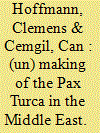

|
|
|
|
|
| Summary/Abstract |
Turkey’s foreign policy activism has received mixed reviews. Some feel threatened by the alleged increasing Islamization of the country’s foreign policy, sometimes called ‘neo-Ottomanism’, which is seen as a significant revision of Turkey’s traditional transatlanticism. Others see Turkey as a stable democratic role model in a troubled region. This debate on Turkish foreign policy (TFP) remains dominated by a sense of confusion about what appear to be stark contradictions that are difficult to make sense of. Intervening in this debate, this article will develop an alternative perspective to existing accounts of Turkey’s new foreign policy. Offering a historical sociological approach to foreign policy analysis, it locates recent transformations in Turkey’s broader strategies of social reproduction. It subsequently argues that, contrary to claims about Turkey’s ‘axis shift‘, its changing foreign policies have in fact never been pro-Western or pro-American. All foreign policy ‘shifts’ and ‘inconsistencies’, we argue, are explicable in terms of historically changing strategies of social reproduction of the Ottoman and Turkish states responding to changing domestic and international conditions.
|
|
|
|
|
|
|
|
|
|
|
|
|
|
|
|
| 5 |
ID:
168613
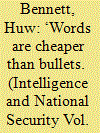

|
|
|
|
|
| Summary/Abstract |
Psychological warfare, the use of propaganda to aid military operations, acquired prominence in British strategy in the early Cold War Middle East. This article argues planning made limited progress until the 1956 Suez crisis. Suez produced optimism about propaganda’s ability to address threats from Egypt, the USSR and the Yemen. In Oman, Aden and Cyprus, psychological warfare was practiced to demoralise enemies, bolster allies and counter smears about British conduct. Only mixed results ensued though, and doubts about the military’s involvement in propaganda lingered. Psychological warfare endured because it was a cheap option that might sometimes work, and could induce opponents to surrender rather than fight on.
|
|
|
|
|
|
|
|
|
|
|
|
|
|
|
|
| 6 |
ID:
161053


|
|
|
|
|
| Summary/Abstract |
The paper studies the “Turkish model” in a comparative historical perspective from three angles: as an example of mobilization modernization; as a combination of liberal democracy and Islam; and as a de-Westernization paradigm. The focus is on the transformation of the “Turkish model” and its substantive evolution from the early 1990s to the middle of the 2010s, and on how peaks of international interest in the “Turkish model” impacted Ankara’s foreign policy activities and its positioning on the international stage by Turkish elites. This approach helped to identify the factors behind periodic resurgence and transformation of the “Turkish model” and the shifting balance between the expectations of its potential recipients and Ankara’s plans to use it as a foreign-policy tool. Research methodology is based on the theory of multiple modernities and the concept of symbolic interactionism in international relations. In the case of Turkey, this approach provides broader possibilities for interpreting Ankara’s foreign-policy strategies and understanding the mechanisms of its relations with other countries in the Greater Middle East.
|
|
|
|
|
|
|
|
|
|
|
|
|
|
|
|
| 7 |
ID:
125600
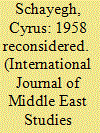

|
|
|
|
|
| Publication |
2013.
|
| Summary/Abstract |
Using Arabic, English, and French sources, and engaging Middle East and Cold War historians, this article makes a threefold argument. First, in United Arab Republic (UAR)-Syria, Jordan, and Lebanon, the 1958-59 explosion of domestic and regional tensions triggered state-formation surges. Second, these formed one process, which made those states more alike, with state-led socioeconomic planning playing a key role. Third, that process partook of a global Third World trend intersecting with the early Cold War. I draw three conclusions. Although existing scholarly readings that the events of 1958-59 in the Arab Middle East formed a crisis but not an ideological or political watershed are correct, from the viewpoint of state formation this crisis was a milestone. Moreover, UAR-Syria, Jordan, and Lebanon had persisting affinities and shared regional positions-notably, the fact that all were sandwiched between the unstable poles of the Arab state system, Iraq and Egypt-that shaped their individual postindependence histories of state formation. Last, Washington's low-profile involvement in this state-formation surge illustrates how domestic sociopolitics and regional geopolitics-including the UAR's peaking popularity and influence in 1958-59-affected U.S. policy in the Cold War postcolonial world.
|
|
|
|
|
|
|
|
|
|
|
|
|
|
|
|
| 8 |
ID:
051382
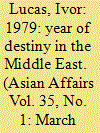

|
|
|
| 9 |
ID:
143474


|
|
|
|
|
| Publication |
Massachusetts, Center for International Studies, 1980.
|
| Description |
67p.pbk
|
|
|
|
|
|
|
|
|
|
|
|
Copies: C:1/I:0,R:0,Q:0
Circulation
| Accession# | Call# | Current Location | Status | Policy | Location |
| 023133 | 330.95195/GRI 023133 | Main | On Shelf | General | |
|
|
|
|
| 10 |
ID:
105962
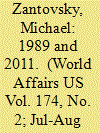

|
|
|
| 11 |
ID:
079200
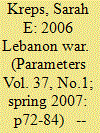

|
|
|
| 12 |
ID:
094124
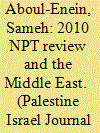

|
|
|
| 13 |
ID:
119257
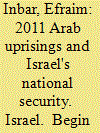

|
|
|
|
|
| Publication |
Israel, Begin Sadat Centre for Strategic Studies, 2012.
|
| Description |
29p.pbk
|
| Series |
Mideast Security and Policy Studies No. 95
|
| Standard Number |
07931042
|
|
|
|
|
|
|
|
|
|
|
|
Copies: C:1/I:0,R:0,Q:0
Circulation
| Accession# | Call# | Current Location | Status | Policy | Location |
| 057185 | 956.054/INB 057185 | Main | On Shelf | General | |
|
|
|
|
| 14 |
ID:
117981
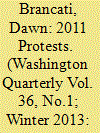

|
|
|
|
|
| Publication |
2013.
|
| Summary/Abstract |
In 2011, throngs of protesters took to the streets, often at great risk to their lives, to challenge the results of undemocratic elections across the globe-in Bahrain, Benin, Egypt, Haiti, Morocco, Nicaragua, Nigeria, and Russia. Outside of elections, pro-democracy protests also took place in 2011 in Cameroon, Libya, Malaysia, Swaziland, Syria, Tunisia, and Yemen, among other countries.
|
|
|
|
|
|
|
|
|
|
|
|
|
|
|
|
| 15 |
ID:
056375
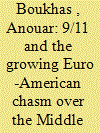

|
|
|
| 16 |
ID:
120283
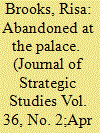

|
|
|
| 17 |
ID:
120295
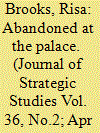

|
|
|
|
|
| Publication |
2013.
|
| Summary/Abstract |
Many analysts have focused on the Tunisian protests and the economic and political grievances that fueled them. Equally central, however, was the role played by the military leadership and the decision to forgo using force to actively suppress the protesters. Contrary to arguments that stress the reflexively apolitical or professional nature of the military, or its leaders' normative commitment to supporting the protesters, this article explains how the decisions made reflected political calculations and served the military's organizational interests. Although heralded as the savior of the revolution, the Tunisian military acted out of its own organizational self-interest in defecting from the Ben Ali regime.
|
|
|
|
|
|
|
|
|
|
|
|
|
|
|
|
| 18 |
ID:
083697
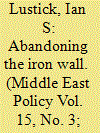

|
|
|
| 19 |
ID:
062023
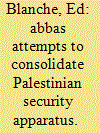

|
|
|
| 20 |
ID:
146360
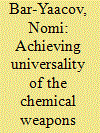

|
|
|
|
|
| Summary/Abstract |
A century ago, at Ypres, in Belgium, the use of chemical weapons in the First World War began. Ninety years ago, in Geneva, a protocol to ban the use of chemical weapons was signed. Two years ago, the attack on Ghouta, on the outskirts of Damascus, forced Syria’s accession to the Chemical Weapons Convention (CWC). A promise to eliminate Syria’s chemical-weapons stocks followed. Yet today, in Syria and Iraq, these abhorrent weapons continue to be used.
|
|
|
|
|
|
|
|
|
|
|
|
|
|
|
|
|
|
|
|
|